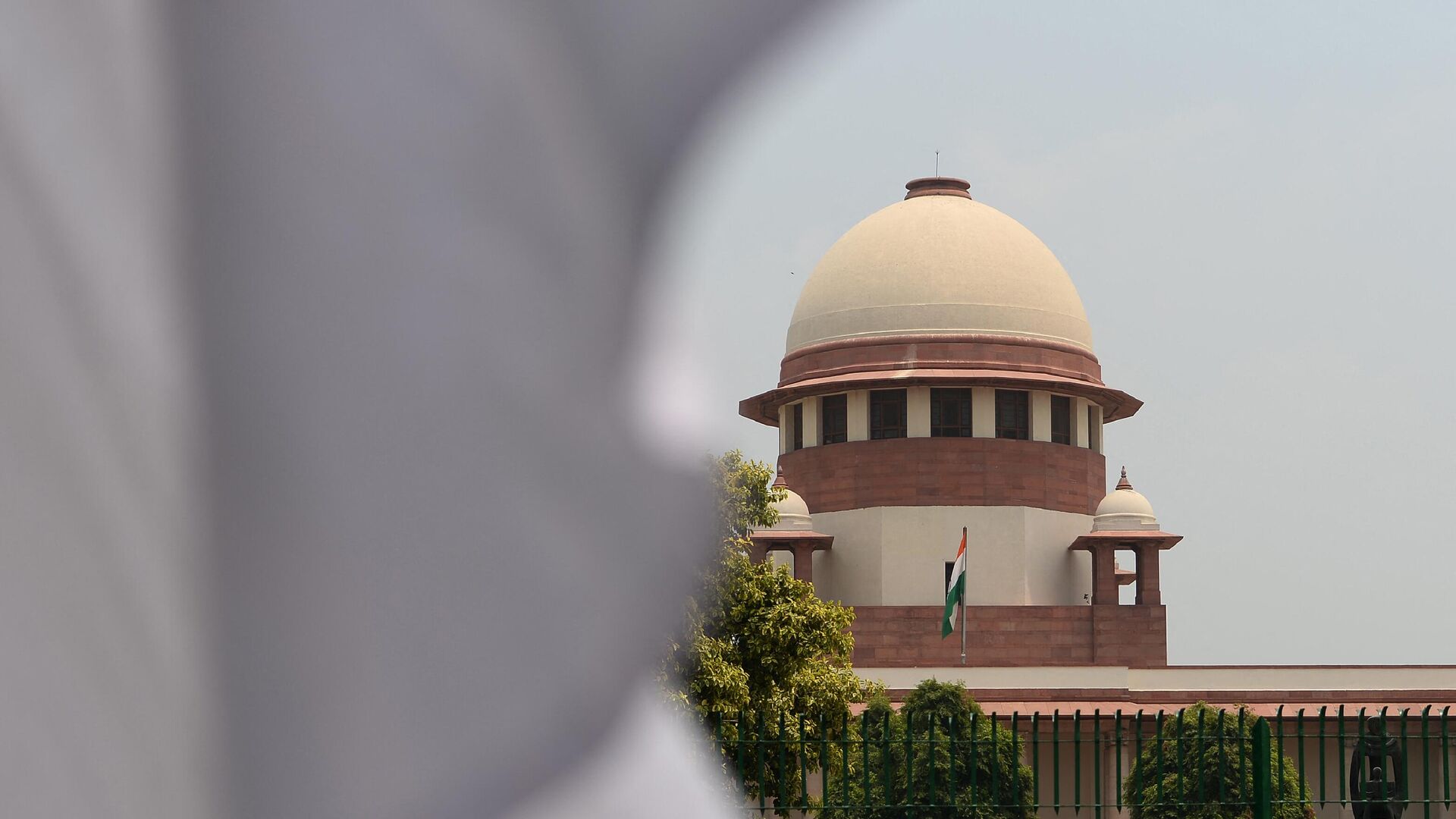https://sputniknews.in/20230215/will-india-criminalize-marital-rape-889253.html
Will India Criminalize Marital Rape?
Will India Criminalize Marital Rape?
Sputnik India
In 2020-2022, crimes against women in India increased by nearly 15%, according to the 2022 National Crime Records Bureau (NCRB) report. 15.02.2023, Sputnik India
2023-02-15T18:02+0530
2023-02-15T18:02+0530
2023-02-15T18:02+0530
india
supreme court of india
crime
domestic abuse
marital rape
violence against women
domestic violence
women's rights
long reads
https://cdn1.img.sputniknews.in/img/07e7/02/0f/892818_0:144:3129:1904_1920x0_80_0_0_531cc21fd1377e239fc691646e18e993.jpg
The Indian government has ensured that strict laws are in place to effectively deal with crimes against women in the country. However, the conviction rate for crimes against women has still stood at around 25.2 percent over the last three years.Statistics Prove Sad RealityIn Indian culture, a woman is considered a goddess. However, statistics prove the opposite.According to reports from the National Crime Records Bureau (NCRB) and National Family Health Survey (NFHS), crimes against women are increasing in India, while the conviction rate is decreasing.Talking specifically about rape, the report said that a total of 31,677 such cases were registered in 2021.Meanwhile, NFHS data published in 2022 indicates that at least 29.3 percent of women in India aged between 18-49 years had faced domestic or sexual violence.What is Marital Rape in the Legal Sense?Today, marital rape remains a taboo matter in India. Rape, which includes all forms of sexual assault involving non-consensual intercourse with a woman, is a punishable offence as per Section 375 of the Indian Penal Code.However, under Exception 2 to Section 375, unwilling sexual intercourse between a husband and a wife over 15 years of age does not constitute “rape” and thus prevents such acts from being prosecuted.Which Countries Have Criminalized Marital Rape?As far as criminalization of marital rape is concerned, Russia was the first country to criminalize it, whereas in the United Kingdom, the accused can be sentenced to lifetime in prison.India is one of 36 countries, among which are also Pakistan, Afghanistan, and Bangladesh, that have not yet criminalized marital rape. The unconstitutionality of marital rape in India is still under debate.In May last year, a Delhi High Court bench of Justices Rajiv Shakdher and C. Harishankar delivered a split verdict on the issue and said that the matter would have to be considered by the Supreme Court.Numerous petitions were then filed with the Supreme Court in September last year, after which it issued a notice to the federal government and listed the matter for hearing in 2023.In January this year, while hearing the matter, the top court asked the federal government once again to file its response to a batch of petitions seeking criminalization of marital rape by February 15 and listed the matter for hearing in March.What Activists SaySputnik reached out to founder of People Against Rapes in India (PARI) and well-known anti-rape activist Yogita Bhayana to understand the gravity of the issue.She further added that the trauma is the same and a lot of women suffer marital rape, but cases go unreported as they fear that they are in an institution and there is a social stigma.Regarding the possibility of the law, should it be introduced, being misused, such as in cases of personal “vendetta,” Bhayana suggested that no other law is safe from that, pointing to the Scheduled Caste and Scheduled Tribe (SC/ST) Act as an example.The matter is now scheduled for hearing on March 21, 2023.
india
Sputnik India
feedback.hindi@sputniknews.com
+74956456601
MIA „Rossiya Segodnya“
2023
Rahul Trivedi
https://cdn1.img.sputniknews.in/img/07e6/0c/13/136500_0:0:628:627_100x100_80_0_0_72097ff894c7446b70d2efafcb719720.jpg
Rahul Trivedi
https://cdn1.img.sputniknews.in/img/07e6/0c/13/136500_0:0:628:627_100x100_80_0_0_72097ff894c7446b70d2efafcb719720.jpg
News
en_IN
Sputnik India
feedback.hindi@sputniknews.com
+74956456601
MIA „Rossiya Segodnya“
Sputnik India
feedback.hindi@sputniknews.com
+74956456601
MIA „Rossiya Segodnya“
Rahul Trivedi
https://cdn1.img.sputniknews.in/img/07e6/0c/13/136500_0:0:628:627_100x100_80_0_0_72097ff894c7446b70d2efafcb719720.jpg
criminalize marital rape, marital rape, delhi high court, kerala high court
criminalize marital rape, marital rape, delhi high court, kerala high court
Will India Criminalize Marital Rape?
In 2020-2022, crimes against women in India increased by nearly 15%, according to the 2022 National Crime Records Bureau (NCRB) report.
The Indian government has ensured that strict laws are in place to effectively deal with crimes against women in the country.
However, the conviction rate for crimes against women has still stood at around 25.2 percent over the last three years.
Statistics Prove Sad Reality
In Indian culture, a woman is considered a goddess. However, statistics prove the opposite.
According to reports from the National Crime Records Bureau (NCRB) and National Family Health Survey (NFHS), crimes against women are increasing in India, while the conviction rate is decreasing.
For instance, an NCRB report indicates that a majority of cases of crimes against women under the Indian Penal Code (IPC) were registered under “Cruelty by Husband or His Relatives” (31.8%), followed by “Assault on Women with Intent to Outrage her Modesty” (20.8%), “Kidnapping & Abduction of Women” (17.6%), and “Rape” (7.4%).
Talking specifically about rape, the report said that a total of 31,677 such cases were registered in 2021.
Meanwhile, NFHS data published in 2022 indicates that at least 29.3 percent of women in India aged between 18-49 years had faced domestic or sexual violence.
What is Marital Rape in the Legal Sense?
Today, marital rape remains a taboo matter in India.
Rape, which includes all forms of sexual assault involving non-consensual intercourse with a woman, is a punishable offence as per Section 375 of the Indian Penal Code.
However, under Exception 2 to Section 375, unwilling sexual intercourse between a husband and a wife over 15 years of age does not constitute “rape” and thus prevents such acts from being prosecuted.
Which Countries Have Criminalized Marital Rape?
As far as criminalization of marital rape is concerned, Russia was the first country to criminalize it, whereas in the United Kingdom, the accused can be sentenced to lifetime in prison.
India is one of 36 countries, among which are also Pakistan, Afghanistan, and Bangladesh, that have not yet criminalized marital rape. The unconstitutionality of marital rape in India is still under debate.
In May last year, a Delhi High Court bench of Justices Rajiv Shakdher and C. Harishankar delivered a split verdict on the issue and said that the matter would have to be considered by the Supreme Court.
While Justice Shakdher stated that the marital rape exception should be struck down, as it violates a woman's right to consent, Justice Harishankar argued that a change in the law could affect marital relationships, as marriage "necessarily" implies consent.
Numerous petitions were then filed with the Supreme Court in September last year, after which it issued a notice to the federal government and listed the matter for hearing in 2023.
In January this year, while hearing the matter, the top court asked the federal government once again to file its response to a batch of petitions seeking criminalization of marital rape by February 15 and listed the matter for hearing in March.
Sputnik reached out to founder of People Against Rapes in India (PARI) and well-known anti-rape activist Yogita Bhayana to understand the gravity of the issue.
“I think rape is a rape irrespective of the fact that the girl or woman is married or not. If there is no consent, it should be considered as a rape because it is about overpowering another gender. Just because a ritual has been performed it doesn’t allow a man to overpower a woman,” Bhayana said.
She further added that the trauma is the same and a lot of women suffer marital rape, but cases go unreported as they fear that they are in an institution and there is a social stigma.
Regarding the possibility of the law, should it be introduced, being misused, such as in cases of personal “vendetta,” Bhayana suggested that no other law is safe from that, pointing to the Scheduled Caste and Scheduled Tribe (SC/ST) Act as an example.
“In order to prevent the misuse of any law there should be thorough investigation and fair trial without prejudice. All the agencies should conduct the probe transparently. We are in the era where we have tools to catch all kinds of lies and frauds,” Bhayana stated.
The matter is now scheduled for hearing on March 21, 2023.


